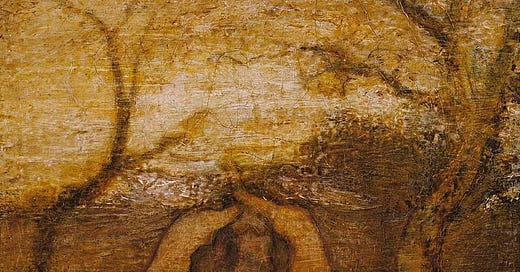Dad,
I distinctly remember a conversation you and I had back when I was in grad school. After a long analysis of some Bible verse or other, you turned to me and asked, “are we becoming Jesus freaks?”
I confess it hadn’t really crossed my mind. You had grown up around New York sophisticates who associated religion with kookery and woo-woo. Whereas I had grown up around you—and even though you hadn’t yet reached full conversion when I was little, you were far enough down the road that the prospect of belief never seemed too outlandish to me.
Some of that may have been temperamental, too. When people ask about my own spiritual trajectory, I always joke that I was born with a certain starter pack installed. By no means was I a preteen Christian, but looking back I think I might have been born a classical pagan by nature rather than a modern rationalist. There have been times in my life when I might have said the world was made of “clockwork, chemicals, and chains of reaction.” But I’ve never really felt that to be true. Intuitively, the world feels to me the way Virgil describes it: “a throne room made of living rock; the home of nymphs.”
One of the things I tried to show in my most recent book is that these sorts of feelings don’t so much arise in us from rational argument as they seep into us from our culture. People didn’t stop believing in angels because at some point they pointed an angelometer at the sky and got a negative result. But they did discover more and more places where angels weren’t—not in the air that floods our veins with oxygen. Not in the grooves the planets roll along. Not in the sap that courses through the trees.
From the very beginning, the believers who made these discoveries were quick to add that belief in the spirit had never depended on finding it in any particular location. But that hardly mattered when the spirits turned out not to be in so many places where people had once implicitly pictured them. All those little evaporations, those local deities and dryads going up in smoke—they made it hard to feel faith the way we used to.
I wonder, though, whether the difference between you and me in this regard isn’t representative of a larger generational difference. The deeper truths of faith—that the world is meticulously and wondrously ordered, that it pulses with intelligence more subtle than we can see or touch, that it has been molded with incredible finesse to cradle human life like a baseball in a well-worn mitt—all these realities are quickly becoming part of the scientific record again.
This too will work its way over centuries into our felt experience of the world. It’s easy to forget that history doesn’t only move in one direction. In time, I predict, the enchantment you sense in your dreams and I felt in my youth will saturate the human imagination like daylight. I’d call that a kind of reawakening.
Love,
Spencer






We've had our purely religious age. We seem to have had the Enlightenment. I wonder if this is the final age of combining the two? I don't see what else is required by human beings. Once we have reconciled religion and science, aren't we at the end of history? Too apocalyptic?
Peopl'ss selfishness will cause them to find things that do not have God in them...but God is there...in the laws of physics and all sciences